YORKTOWN, Indiana – Julie Harman Vance loaded up her delivery van full of floral arrangements early on Saturday.
On any other Saturday, the owner of Buck Creek in Bloom would be making deliveries for weddings, funerals, proms and any other event that needs a special touch that only live plants and flowers can bring.
But on this Saturday, May 25, Vance is making a special delivery to the Indianapolis Motor Speedway.
It’s the Borg-Warner Wreath, the first item that is given to the winning driver of the Indianapolis 500 in Victory Lane.
As the victor is climbing out of his car, the winner’s wreath is place over his neck and the famed Borg-Warner Trophy is held by two men – known as “Yellow Shirts” and placed behind the winner on the engine cover.
More traditions follow, such as the famed “Bottle of Milk” from the American Dairy Association of Indiana.
When Harman-Vance arrives at the Indianapolis Motor Speedway early the day before the race, she doesn’t need a credential.
All she has to do is tell the security guard at the gate what is inside the van and where it’s being delivered.
“I have a routine,” Vance told NBCSports.com. “I go to the same gate and tell them I’m in tote with the winner’s wreath, and they flag me into the Pagoda, and we place that in the in the Green Room and it sets there until race morning with guards.
“I feel like it’s my all -access pass. If I have that wreath in front of me, I can walk about anywhere. It draws attention and when people start noticing and they’ll just flock around it.”
To see the reaction from the fans at the Indianapolis Motor Speedway to her floral creation is worth more than the commission she receives from BorgWarner. It shows how much Indy 500 loves and appreciate what the wreath represents and for how well she creates it.
“Oh, it’s amazing,” Vance said. “It is just amazing.”
This year is extra special, however.
It’s the 33rd “Winner’s Wreath” that Harman-Vance has created. The number “33” is important because it represents the 33-driver starting lineup that competes in the Indianapolis 500.
At last year’s Indianapolis 500 Victory Award Banquet, sculptor William Behrends was honored for his 33 years of casting the winner’s image in sterling silver on the Borg-Warner Trophy. Earlier this year, the 34th face crafted by Behrends was attached to the trophy to honor the winner of the 107th Indianapolis 500, Team Penske’s Josef Newgarden.
There are many great traditions that are part of winning the Indianapolis 500. From the traditional “Bottle of Milk” that goes to the winner in Victory Lane, to the face that is etched on the Borg-Warner Trophy immortalizing the winner for the ages to the victory lap in the Pace Car after the race where the fans can hail the latest victor of the Indy 500.
But there is another long-standing tradition that is equally important, and it has happened in every Indianapolis 500 since 1960. It is also the first of the many traditional honors that goes to the winner of the world’s biggest race.
It’s the “Winner’s Wreath” presented by BorgWarner.

It’s as much a part of the time-honored traditions as any other honor bestowed to the winner and its roots are unique to Indiana.
Take a ride northeast from Indianapolis toward Muncie, Indiana and there is the typical Hoosier community of Yorktown. With a population of 11,548 as of the 2020 US Census, it’s just 6.2 miles from Muncie, where Ball State University is located.
Yorktown High School has fielded some pretty good basketball teams in its day and has earned a place in “Hoosier Hysteria” – the annual state basketball tournament in March that has earned worldwide acclaim.
Yorktown is also 60 miles from the Indianapolis Motor Speedway.
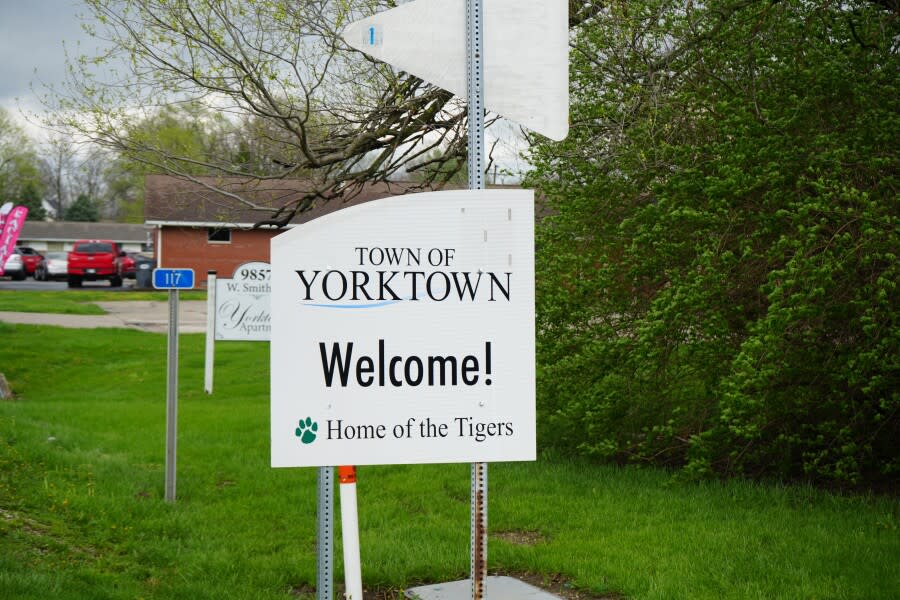

Nestled just off the main street of Yorktown is Buck Creek in Bloom, the small floral shop operated by Harman-Vance. She graduated from Yorktown High School in 1988 and attended college for commercial arts and design in Indianapolis.
Bill Cronin had been making the “Winner’s Wreath” for the Indianapolis 500 since 1960. The roots of this tradition came from Europe, not the Midwest.
Racing drivers in Europe, including Formula One, were honored after a victory with a floral blanket that draped over the winner’s shoulder.
With some of Europe’s top racing drivers, such as Sir Jack Brabham coming to the Indianapolis Motor Speedway to compete in the Indianapolis 500, a special wreath was created that would immediately be draped over the winning driver as soon as he pulled into Victory Lane.
Cronin was a longtime Indianapolis florist who was also a consultant for the Tournament of Roses Parade held on New Year’s Day in Pasadena, California, the Cotton Bowl Parade in Dallas, Texas, and the 500 Festival Parade in Indianapolis.
Ironically, Vance never met Cronin, but the two would be part of a bond that continues to this day.
Cronin passed away after the 1989 Indianapolis 500. Kay Totten, one of Bill York’s assistants in various media centers around Indianapolis including those for the Indiana Pacers of the NBA, Indianapolis Colts of the NFL, and the Indianapolis Motor Speedway, had worked with Harman-Vance and asked if she would be interested in making the wreath.
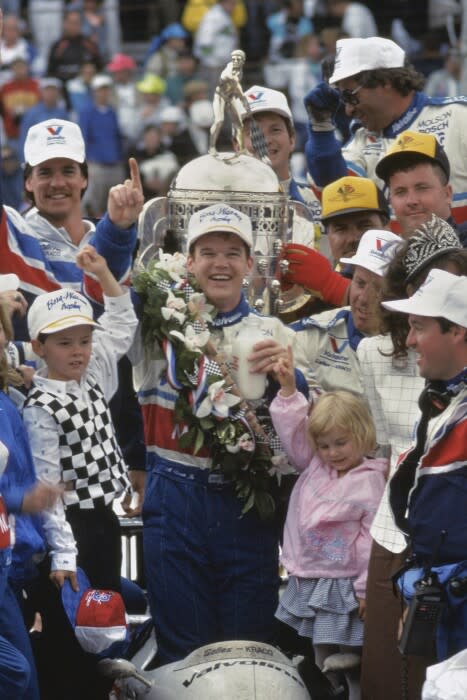

Harman-Vance accepted, and her first wreath was for the 1992 Indianapolis 500. It was presented to the winning driver, Al Unser, Jr., in a very cold Victory Lane after he defeated Scott Goodyear in what remains the closest Indy 500 finish in history.
She has made the wreath ever since and this year marks the 33rdIndianapolis 500 for Harman-Vance as the creator of the “Winner’s Wreath.”
On April 30, the Indianapolis Motor Speedway and BorgWarner honored the “Wreath Girl” at the main gate of the Indianapolis Motor Speedway with a special presentation that included 1992 Indianapolis 500 winner Al Unser, Jr. – the first to wear her wreath.
“It was the first time that we actually met each other and here we are 33 years later,” Unser told NBCSports.com. “It was an honor for me to meet the lady that made the wreath that I wore in 1992.
“She was a little bit speechless.”
BorgWarner publicist Steve Schunk made it a special day for Harman-Vance, presenting her with a beautiful poster of some past winners including Helio Castroneves, Tony Kanaan, Ryan Hunter-Reay and Unser that was signed by each driver.
“I think it speaks for itself,” Unser said of the tradition. “BorgWarner and the Indianapolis Motor Speedway, there’s so many people that are behind the scenes that support this whole thing. It’s great to be able to acknowledge those that are behind the scenes like Julie has been for the last 33 years. And so, it’s a great honor.”
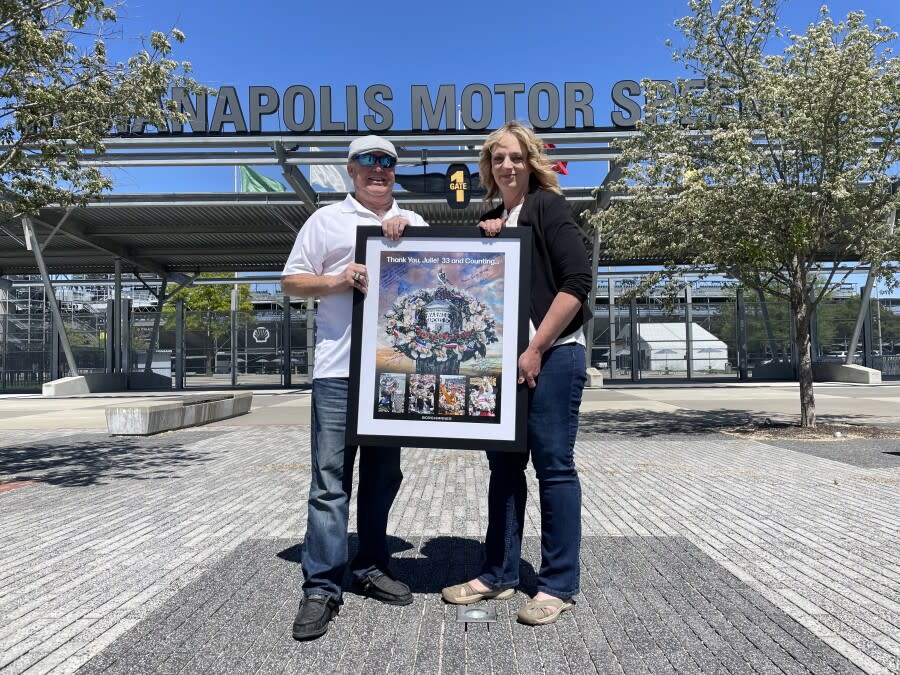

Unser has what is left of his wreath at the Museum of American Speed. Because the living floral part of the wreath has long since decomposed, the wooden frame and base remain.
“Anytime you do well at Indy, you never forget any of the traditions,” Unser explained. “The wreath, the bottle of milk, the Borg-Warner Trophy being put on the back of your car. It’s all super special and I remember it like it was yesterday.”
Harman-Vance was asked to come to the Indianapolis Motor Speedway to meet with IMS officials about an upcoming display in the museum, once it opens in 2025 following a massive renovation currently underway.
She didn’t realize she was about to be honored.
“It is very cool, and Steve had a picture here of the cover of the newspaper with the wreath and Al Unser, Jr. after he won in 1992 and it brought back a lot of young memories for me,” Harman-Vance said. “And the poster is very special. I can’t wait to hang it up.
“Oh yeah, it says 33 and counting at the top that’s so nice.”
The drivers that have won the Indianapolis 500 keep the traditional items, such as the bottle of milk that was presented to them and, of course, the Baby Borg Trophies – smaller versions of the famed Borg-Warner permanent trophy.
Dario Franchitti has each of his three Indy 500 winning wreaths specially preserved, mounted and framed.
The many traditions, along with the storied history of brave and courageous athletes who face risk, danger and speed without flinching is what makes tokens like the wreath so important because of what it represents.
“As far though as the wreath, it’s really the first of the traditions that you get as the winner,” 2018 Indy 500 winner Will Power told NBCSports.com. “It’s a cool tradition. They also did that at Watkins Glen. I remember getting a wreath, and that was something that you always saw growing up, were drivers getting a wreath.
“Another one of the cool traditions of the Indianapolis 500.
“Those traditions are important. As the history of the Indianapolis 500 is extremely important.
“It’s good stuff, man.”
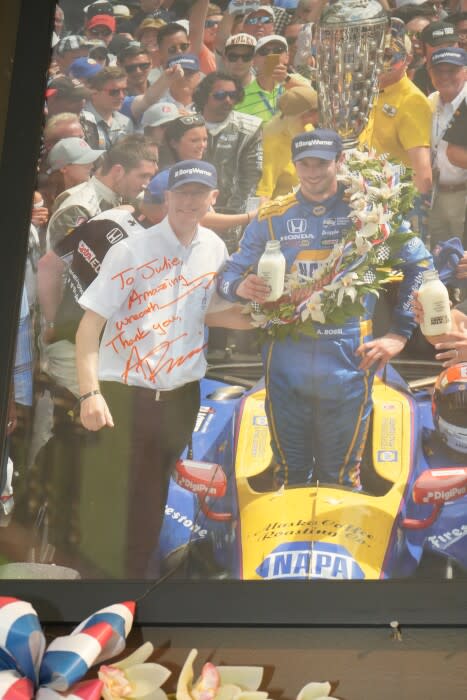

When Alexander Rossi won the 100th Indianapolis 500 in 2016, it was his first career IndyCar win.
Incredulous, he arrived in Victory Lane after that historic victory and proclaimed, “I don’t know what I’m supposed to do.
“What do I do next?”
It didn’t take long as the honors and traditions of winning the Indy 500 seem to operate on kinetic energy. It’s a procedure that is time honored.
“It’s one of them,” Rossi told NBCSports.com. “So that means it’s important. It doesn’t really matter the scale in my mind, whether it’s the wreath, whether it’s the milk, whether it’s the rookie luncheon, it’s all a part of the fabric of what makes that race what it is.
“And so, it’s one of those things that is iconic in pictures, it’s iconic in your memories, it’s something I have displayed in my house, and hopefully I can get another one.
“It’s beautiful, I don’t have many racing things displayed in my house but that is one of them. How I preserved it is I paid someone to do it. That’s about it.
“The wreath is preserved, and I even gave Josef Newgarden my guy.”
Newgarden has preserved his wreath with intentions of displaying it in honor at his home. It’s in an acrylic case. The wreath has been reconstructed and preserved as it was on the day that he received it on May 28, 2023.
Just a year removed from his incredible Indianapolis 500 victory, he was able to savor the moment, the chaos, and the honor that comes with the victory, including the wreath.
“It’s all just so incredible to experience,” Newgarden told NBCSports.com. “The wreath’s a part of it. You see it, and then you really get to experience it when you win the race. You see the authenticity of it. It’s all real orchids and it’s handmade and it feels like this time capsule in a lot of ways.
“The Indianapolis 500 is over 100 years old, and it feels like this wreath, came in perfect condition from like the 1950s. It gives you that sort of special feeling. It’s that along with everything else, but it’s real. And it’s really special.”
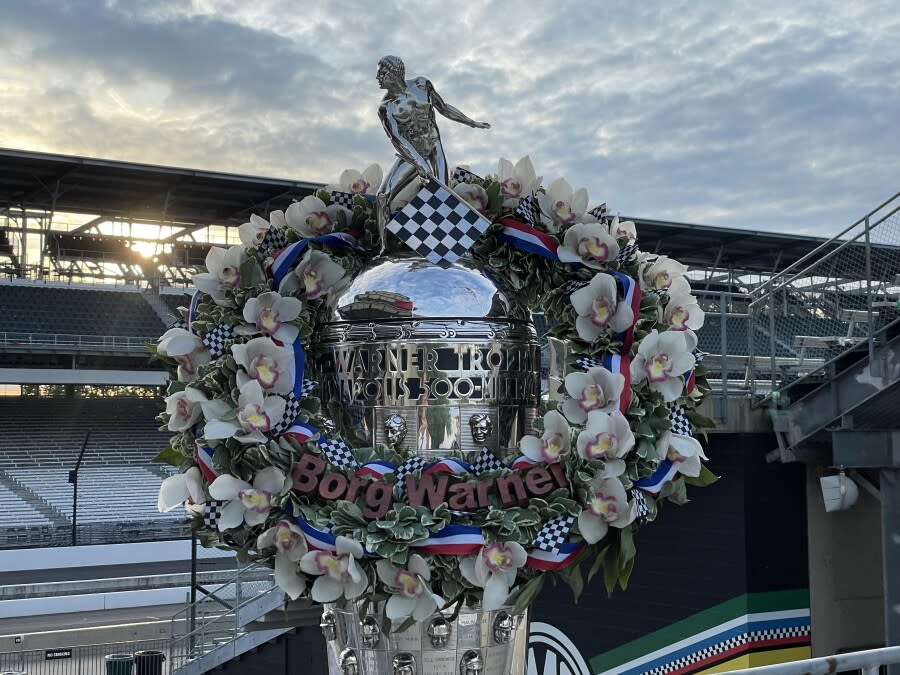

It started in 1960, but in a way it also kind of has a little bit of an international flair to it because Watkins Glen gave the winner a wreath. In Europe, Formula One drivers have had like the flower sleeve when they win a race.
The wreath appeared for the first time at the Indianapolis 500 in 1960 and will make its 65th appearance on Sunday.
“I think it’s fitting,” Newgarden said. “Obviously, for the 500, it’s become ingrained in the tradition amongst other items. But I think it’s all important.
“Look, Indy stands alone to me, even if there are wreaths at other races. But the traditions that Indy have become iconic and synonymous with that event. And so, when I see the wreath, I think of Indy every time.
“What Julie Harman Vance does is very special. You find these different groups that are involved in these pieces, and I think it’s so special for them. And I find it that it’s special for Indianapolis to find local procurement for those pieces. They find people that live in Indianapolis or in the surrounding areas of Indiana that understand the significance of the 500, and they’re able to supply it to that race from the hometown.
“I would love to meet her. She makes beautiful wreaths.”
A smaller, mini wreath was made for his young son, Koda. It was the wreath that goes around the Borg-Warner Trophy but was presented to Newgarden to give to his son.
“That one got preserved too,” Newgarden said. “It was so cool. It was literally, half the time. size for him. It was very, very, very special.
“I need to thank whoever did that.
“The traditions make the event, and they should be preserved, and they should be honored every year. It’s what makes it so special. And it’s also what gives you so much pride,
“I think, when you win the race, is going through that. So, yeah, they should always hold a special place in the race.”
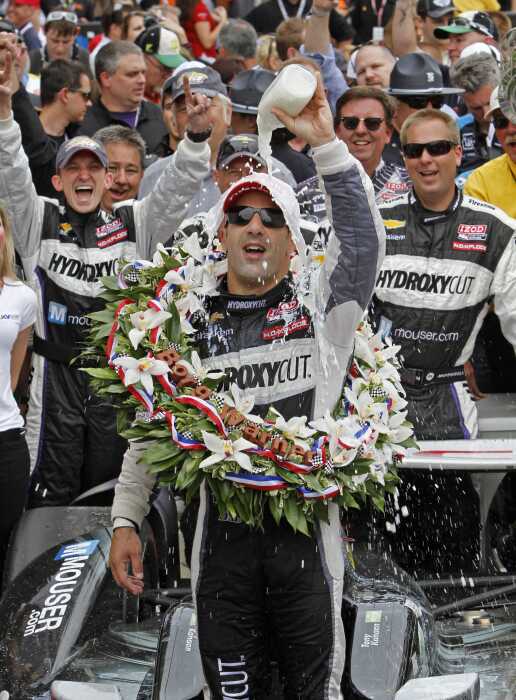

Tony Kanaan is the 2013 Indianapolis 500 winner and the Sporting Director at Arrow McLaren. This is the first Indianapolis 500 that he won’t be behind the wheel of an Indy car since 2001.
But Kanaan has lasting memories of his days at the Indy 500.
“It’s part of the tradition, right?” Kanaan told NBCSports.com. “I do have it, but it looks like it is weathered because it is 10 years old now. It’s the wreath you keep the bottle that you drink the milk and the trophy so in the Borg Warner…
“I still have it. It’s not in a good shape. I might convince her to make me a new one maybe.
“Julie Harman Vance is part of the best day of my life.”
Marcus Ericsson is the 2022 Indianapolis 500 winner and has struck up a friendship with Harman-Vance. He proudly displays his wreath in his home in Indianapolis.
“It’s a very special and important piece of history,” Ericsson told NBCSports.com. “It’s one of many cool things with winning that race.
“She is super talented. It’s part of the history and part of what makes it so special, things like that.”
The Borg-Warner Wreath is like preserving a classic car. Is it better to keep it in its natural condition? Or should it be refurbished by adding newer and more permanent items?
“That is in the eye of the beholder, because I have been told they want that particular one that was given to them in Victory Lane,” Harman-Vance said. “When Penske wins, they have a little routine where they dry the greenery part, and I ship them silk orchids that are on little metal spikes so they can replace the orchids because they won’t dry. But I have everything at my shop always to make perfect silk version where the greenery is botanically correct to the fresh greenery that I use on race day, and I have silk orchids that look almost ideal, almost exact to the fresh ones. ones.
“So yes, I can make a silk version.”
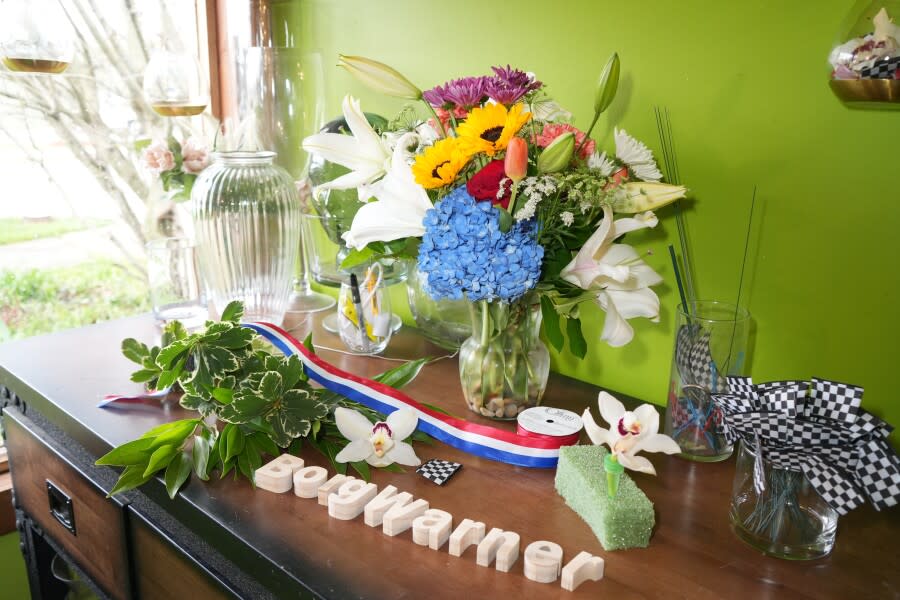

The process of making the wreath starts early in the year to make sure she has all the components, the wooden letters, the red-white-and-blue ribbons, the small, checkered flags.
The fresh greenery and fresh orchids aren’t delivered until race week for the Indianapolis 500.
“My wholesalers always seek out the absolute best product that’s available in the world,” Harman-Vance explained.
The wreath starts with a 24-inch polyurethane wreath base. The greenery part, which is the fullness of it, the cocculus and the variegated pittosporum are both Florida grown greenery.
The 33 orchid blooms come from New Zealand and are a specific variety of orchid that are about four inches wide. They are a nice stark white color with a burgundy throat. Whereas other orchids might be cream, and they might only be two- and-a-half inches wide, these are big premium, large bloom orchids.
And because of the growing seasons in the state of Indiana and the fact that the Indianapolis 500 is on Memorial Day weekend at the end of May, she is not able to really use native plants or flowers from the state of Indiana.
“We are just getting over winter,” Harman-Vance explained. “The flowers will come to me on Tuesday, and I’ll start the designing process on Thursday only because of it being fresh product, it can’t be made too far ahead to ensure that it’ll hold up nicely.
“I make two exact winner’s wreaths. One is for the actual winner. The other one is for the photo shoot the next day. Of course, the winter’s wreath usually gets completely torn up because of the frenzy of happiness and hugs and kissing the bricks.”
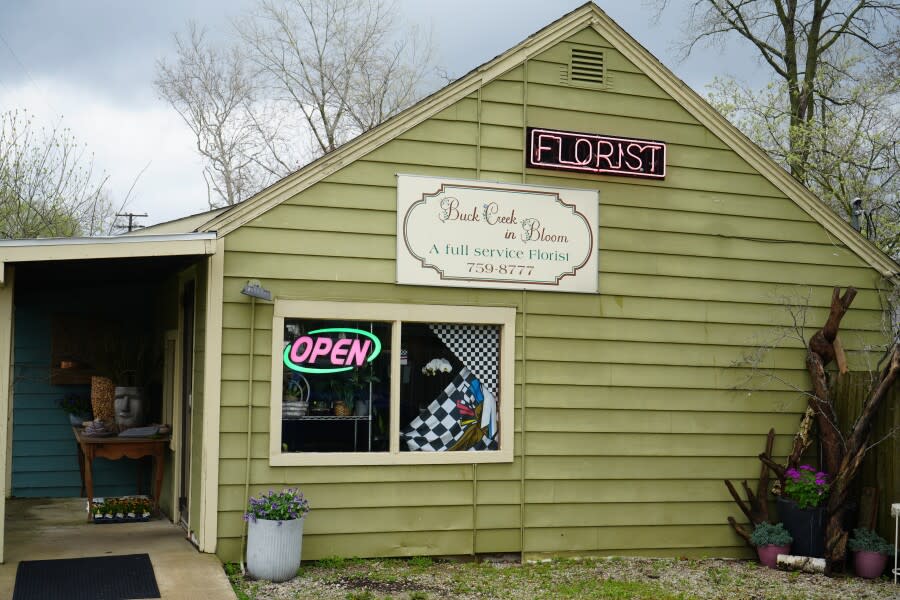

Thirty-three years, 33 wreaths, it’s all a labor of love for this florist in small town Indiana that has become as much a part of the fabric of the Indianapolis 500 as any home-grown Hoosier.
Thirty-three is an important number because it represents the starting field for the Indianapolis 500.
“I am very honored,” Harman-Vance told NBCSports.com at her floral shop on April 12. “Thirty-three years is more than half my life that I’ve made this wreath. It’s also the number of drivers that start the race, so it’s a special number this year.
“All these years later, I’ve taken very good care of it and made it my top priority to make it perfect.”
Harman-Vance’s father is an avid Indianapolis 500 and has attended the race every year for decades. When Julie was just six years old, Harman took his young daughter to the Indianapolis 500 for the first time in 1976.
“My very first memories are just kind of sitting along the bleachers, kind of playing in the grass and just taking it in,” Harman-Vance recalled. “I did say something about ‘Mario Spaghetti’ (referring to Mario Andretti) that continuously was a funny story that my dad loved to tell about myself.”
One year, Harman and young Julie were seated directly across from the “Snake Pit” back when it was a wild den of debauchery, instead of the music and EDM festival that it is today.
“There was a lady with a large sign showing off some private areas of her body,” Harman-Vance remembered. “My father was horrified by that and with good reason because as soon as I could drive when we were 16, you know me, and my friends took off to seek out the Snake Pit.”
Times have changed, of course.
From a 6-year-old little girl who called Mario Andretti “Mario Spaghetti” to a vital steward of one of the most revered traditions at the Indianapolis 500, Julie Harman-Vance is the “Wreath Lady” of the Indy 500.
“I’d rather be called, ‘The Wreath Girl,’” she said. “Not to brag, but I feel like I was the person for this. I feel like I have made it top priority to make it absolutely perfect. And if I wouldn’t have done such a good job, I probably wouldn’t have still be standing in these shoes.
“It is very, very important to me and I appreciate that order very much.”
Follow Bruce Martin on Twitter at @BruceMartin_500
Source Agencies


